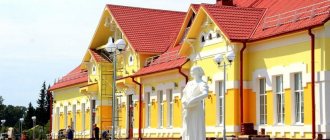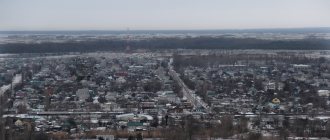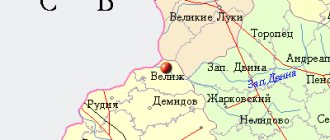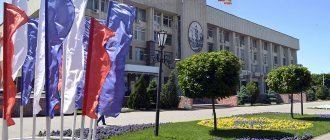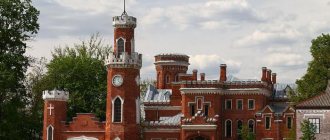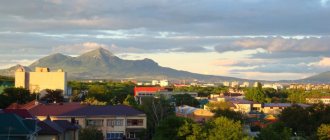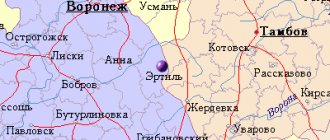City in Voronezh Oblast, Russia
| Ostrogozhsk Ostrogozhsk | |
| Town[1] | |
| The village of Zybtsev in the city of Ostrogozhsk | |
| Flag Coat of arms | |
| Location Ostrogozhsk | |
| Ostrogozhsk Location Ostrogozhsk Show map of Russia Ostrogozhsk Ostrogozhsk (Voronezh region) Show map of Voronezh region | |
| Coordinates: 50°52′N 39°04′E / 50.867°N Latitude 39.067°E / 50.867; 39.067Coordinates: 50°52′N 39°04′E / 50.867°N Latitude 39.067°E / 50.867; 39.067 | |
| A country | Russia |
| Federal subject | Voronezh region[1] |
| Administrative region | Ostrogozhsky district[1] |
| urban village | Ostrogozhsk[1] |
| Based | 1652 |
| City status from | 1765 |
| Height | 110 m (360 ft) |
| population (2010 Census)[2] | |
| • General | 33,842 |
| • Evaluate (2018)[3] | 32,601 (-3.7%) |
| Administrative status | |
| • Capital from | Ostrogozhsky district[1], Ostrogozhsk town[1] |
| Municipal status | |
| • Municipal district | Ostrogozhsky municipal district[4] |
| • Urban village | Urban settlement Ostrogozhsk[4] |
| • Capital from | Ostrogozhsky municipal district[4], Ostrogozhsk town[4] |
| Timezone | UTC + 3 (MSK [5]) |
| Postal code(s)[6] | 397850, 397852–397855 |
| Dial code(s) | +7 47375 |
| OKTMO I WOULD | 20631101001 |
Ostrogozhsk population
| 2010 Census | 33,842[2] |
| 2002 Census | 34,585[7] |
| 1989 Census | 34,492[8] |
| 1979 Census | 34,044[9] |
Ostrogozhsk
(Russian: Ostrogozhsk; ; Ukrainian: Ostrogoz'k, romanized: Ostrogoz'k)) is a town and administrative center of Ostrogozhsky District in Voronezh Oblast, Russia, located on the Tikhaya Sosna River (a Dons tributary), 142 km south of Voronezh, the administrative center of the region. As of the 2010 Census, its population was 33,842.[2]
Story
Ostogozhsk is the historical center of Eastern Sloboda Ukraine. Founded in 1652 by Ukrainian Cossacks as Ostrogozhsk or Ostrogozhsk.[10] (small fortress) and its construction was approved by the Russian governor Fyodor Arsenyev[11]. Ivan Dzinkovsky brought with him about 2,000 settlers from Chernigov and Nizhyn regiments around the forts
(fortress) Belgorod line of defense from Russia. By the nature of its foundation, the population of the city historically consisted of the majority of Ukrainian Cossacks. The largest of the Sloboda Cossack regiments was the Ostrogozhsky regiment, which consisted of 1,000 registered Cossacks. In order to coordinate the defense of these territories with the troops of the Russian garrison and the areas of the Belgorod defensive zone, the Cossack regiments were transferred to the subordination of the Belgorod Army Group.[12]
During the Stepan Razin uprising against Alexei Mikhailovich of Russia, the city was under the control of the rebel Cossacks.[13]
In 1696, Peter the Great stopped in Ostrogozhsk to meet with Hetman of the Zaporozhye army Ivan Mazepa and the Cossacks of the Ostrogozh regiment.[14] A memorial dedicated to this event was erected on the city square of Ostrogozhsk.[15][16]
In 1708 Ostogozhsk was included in the Azov province.
In 1724, the Russians who lived in Ostrogozhsk, who were called "posad people" by local residents, moved to Korotoyak and the Ukrainian Cossacks who lived in Korotoyak moved to Ostrogozhsk.[17]
The city served as the headquarters of the Sloboda Ukrainian Cossack territorial military regiment until the 1760s, when it was abolished. Catherine II.[18] In 1765, the city of Ostrogozhsk was included in the newly formed Sloboda Governorate of Ukraine.[19] In 1802, the city of Ostrogozhsk found itself in the new Voronezh province[19] and in the same year it was granted city rights. Since then, the city has become the center of the divided Eastern Sloboda Ukraine.
According to the Russian Census of 1897, there were 51.4% Little Russians (Ukrainians) in the city of Ostogozhsk and 46.8% of the city's population were Great Russians (Russians).[20] Residents of the city continued to preserve their Ukrainian customs and Cossack traditions well into the twentieth century, and their remains are a district of the city called "Maidan".[21]
In 1918, the city was controlled by the Ukrainian People's Republic and the Ukrainian Hetmanate.[15] Since 1919, the city was controlled by Anton Denikins White Army of Southern Russia. In 1920, Ostrogozhsk became part of Soviet Russia, while the borders between Soviet Russia and Soviet Ukraine were not defined until 1925.[15] According to the 1926 census, ethnic Ukrainians made up 74.1% of the city's residents and 69.6% of the county's residents.[22] In 1928, Ostrogozhsk became the administrative center of the district on the current territory. Voronezh region. The city was occupied by Nazi Germany during World War II from July 5, 1942 (during the Battle of Voronezh) until January 20, 1943, when it was liberated during the Ostrogozhsk–Rossosh Offensive.
Economy
Among the main enterprises of the city are a tannery, food industry enterprises (bakery plant, meat processing plant, malt production plant). Previously, there was also a plant for the production of bricks and ceramic products “Ostrogozhskaya Ceramics” (another name is “Ostrogozhsky Brick”), a carpentry plant, and a butter and cheese factory.
The following hotels are located in the city: “Olympus”, “Rassvet”, “Castle” and mini-hotel “Petrovsky”. Mobile communications in Ostrogozhsk are provided by five mobile operators: MTS, Beeline, MegaFon, Tele2 and Kodotel.
Until June 1, 2012, military unit No. 20115 of the Russian Automotive Troops was located in the city of Ostrogozhsk (disbanded), and a military training vehicle operates in its place.
Military unit No. 20115 of the Russian Automobile Troops was renamed VC No. 20155 and resumed its activities in July 2014.
Recommendations
Notes
- ^ a b c d f g gram hour
Law No. 87-OZ - ^ a b c
Federal State Statistics Service of Russia (2011).
“All-Russian Population Census 2010. Volume 1" [All-Russian Population Census 2010, vol. 1]. All-Russian Population Census 2010 [All-Russian Population Census 2010]
(in Russian). Federal State Statistics Service. - "26. The size of the permanent population of the Russian Federation by municipalities as of January 1, 2022.” Federal State Statistics Service. Retrieved January 23, 2022.
- ^ a b c d f
Law No. 88-OZ - "On the calculation of time." Official Internet portal of legal information
(in Russian). June 3, 2011. Retrieved January 19, 2022. - Post office. Information and computing center of OASU RPO. ( Post office
).
Search for postal facilities ( Search for postal facilities
) (in Russian) - Federal State Statistics Service of Russia (May 21, 2004). “The population of Russia, the constituent entities of the Russian Federation as part of federal districts, urban settlements, urban settlements, settlements, settlements is 3 thousand or more people” [Population of Russia, its federal districts, constituent entities of the federation, districts, urban settlements, rural settlements - administrative centers, rural settlements with a population of more than 3000 people] (XLS). All-Russian Population Census of 2002 [All-Russian Population Census of 2002]
(in Russian). - “All-Union Population Census of 1989. The current population of union and autonomous republics, autonomous regions and districts, territories, regions, urban settlements and villages. All-Union Population Census of 1979. National composition of the population by regions of Russia” [All-Union Population Census of 1979. Ethnic composition of the population by regions of Russia] (XLS). All-Union Population Census of 1979 [All-Union Population Census of 1979]
(in Russian).
1979 - via Demoscope weekly
(website of the Institute of Demography of the State University - Higher School of Economics. - Bad, Sergei, 1957-. Cossack Myth: History and Statehood in the Age of Empires
. ISBN 1-107-44903-0. OCLC 1041371688.CS1 maint: multiple names: list of authors (link to site) - Russo-Turkish War 1768–1774: Catherine II and the Ottoman Empire
. Bloomsbury Academic. 2016. doi:10.5040/9781474211147. ISBN 978-1-4725-1293-2. - Davis B. Russian-Turkish War of 1768–1774: Catherine II and the Ottoman Empire. London, 2016. P. 75.
- Kollmann, Nancy: Crime and Punishment in Early Modern Russia. Cambridge, 2012. P. 377.
- “Ostrogozhsk” & hl = de & sa = X & ved = 0ahUKEwiQwOSzwr_oAhUZ5KYKHe3KA1EQ6AEIRDAD # v = onepage & q = “ostrogozhsk” & f = false Plokhy S. Cossack myth: history and nationality in the era of nationality. Cambridge, 2012. P. 21.
- ^ a b c
Leonov, I.
Ukrainian Don Region
. "Young Ukraine" - "OSTROGOZK". resource.history.org.ua
. Retrieved March 13, 2022. - Bad, Sergei, 1957-. Cossack Myth: History and Statehood in the Age of Empires
. ISBN 1-107-44903-0. OCLC 1041371688.CS1 maint: multiple names: list of authors (link to site) - ^ a b
Smoliy, V.A.
Ivan Dzykovsky (DZIKOVSKY IVAN). Encyclopedia of Ukrainian History. - Demoscope. 1897 Census
- “Ukraine is Young:.: Vidannya | Ukrainian Podonnya". January 12, 2016. Archived from the original on January 12, 2016. Retrieved June 1, 2020.
- "Ostrozhye" www.encyclopediaofukraine.com
. Retrieved March 31, 2022.
Sources
- Voronezh Regional Duma. Law No. 87-OZ of October 27, 2006 “On the administrative-territorial structure of the Voronezh region and the procedure for changing it,” as amended. Law No. 41-OZ of April 13, 2015 “On Amendments to the Law of the Voronezh Region” On the administrative-territorial structure of the Voronezh Region and its procedure for changing it “”. Came into force after 10 days from the date of official publication. Published: “Young Communard”, No. 123, November 3, 2006 (Voronezh Regional Duma. Law No. 87-OZ of October 27, 2006 On the administrative-territorial structure of the Voronezh region and the procedure for changing it
As amended by the Law of April 13, 2015 No. 41-OZ.
On amendments to the Law of the Voronezh Region “On the administrative-territorial structure of the Voronezh Region and on the procedure for its amendment"
. Valid after 10 days from the date of official publication.). - Voronezh Regional Duma. Law No. 88-OZ of December 2, 2004 “On establishing boundaries, granting the status of administrative determination to the centers of the municipalities of Gribanovsky, Kashira, Ostrogozhsky, Semiluksky, Talovsky, Khokholsky negation and the city of Novovoronezh,” as amended. Law No. 77-OZ of June 4, 2015 “On amendments to certain legislative acts of the Voronezh region in connection with changes in some municipalities of the Voronezh region.” Came into force on the date of official publication. Published: “Commune”, No. 189, December 4, 2004 (Voronezh Regional Duma. Law No. 88-OZ of December 2, 2004. On establishing boundaries, assigning the appropriate status, creating administrative centers of the municipalities of Gribanovsky, Kashira, Ostrogozhsky, Semiluksky , Talovsky, Khokholsky districts and the city of Novovoronezh
As amended by Law No. 77-OZ dated June 4, 2015.
On amendments to various legislative acts of the Voronezh region in connection with changes in the boundaries of several municipalities of the Voronezh region
. Valid from the date of official publication.
Culture
The city has a local history museum, the house-museum of I. N. Kramskoy, an art gallery named after I. N. Kramskoy, a house of pioneers, a children's library, a regional inter-settlement central library, the Urozhay stadium, a young technicians station (SYuT), and the Zhemchuzhina swimming pool. "[8].
The regional newspaper Ostrogozhskaya Zhizn is published. A number of architectural monuments have been preserved - merchant houses of the 19th - early 20th centuries. In the center of the city there is a memorial stone at the site of the historical meeting of Peter I and Hetman Mazepa.
Rossosh is large and influential within the region
The second place in the list, with a significant gap from the leader, is occupied by Rossosh, where 16 times fewer residents live than in the capital: 62,827. Since 2002, the population has been constantly fluctuating, but continues to remain within 62,000. The ethnic composition is of interest: almost 13% - Ukrainians, 84.6% - Russians.
The settlement cannot boast of a rich history: it was founded as a settlement in the 17th century, but no remarkable events took place here. The settlement acquired importance only during the Great Patriotic War: the enemy’s right flank was based in the vicinity, and food was supplied through Rossosh. This strategic position led to the Ostrogozh-Rossoshanskaya operation in 1943, as a result of which the town was liberated.
Liski is old and large by the standards of the region
Liski is one of the oldest settlements in the region, founded in 1571 as the village of Pokrovka. Over the next 300 years, the settlement developed poorly, even despite the construction of the railway and the opening of the Liski railway station near the village. In 1928, the station and the village merged, which led to the development of a new administrative unit and an increase in the number of residents. A decade later, Liski was given city status and a new name - Sloboda.
Since 2012, there has been a decline in numbers: by 2022 there has been a decrease of 3,000. People in the town are retained by a fairly developed industry: there are more than 15 enterprises. The agro-industrial complex and agriculture are well developed. Liski produces 24.8% of the regional volume of milk and 44.2% of meat products.
Literature
- Ostrogozhsk // Encyclopedic Dictionary of Brockhaus and Efron: in 86 volumes (82 volumes and 4 additional). - St. Petersburg, 1890-1907.
- Khalimonov A. D.
Ostrogozhsk. — Voronezh: Central-Chernozem. book publishing house, 1978. - 176 p. - Lappo G. M.
Cities of Russia: encyclopedia. - M.: Great Russian Encyclopedia, 1994. - P. 338-339. - Gorkin A.P.
Geography of Russia: encyclopedic dictionary. - M.: Great Russian Encyclopedia, 1998. - P. 434. - Pospelov E. M.
Geographical names of the world. Toponymic dictionary: about 5000 units. - M.: Russian dictionaries, LLC "Publishing House Astrel", LLC "Publishing House AST", 2001. - P. 315.
The largest cities in the Voronezh region by population
The region boasts the presence of 15 cities, but only one of them is considered large - the capital of the region, Voronezh. This is the only million-plus city, where 1,047,549 people live as of 2022. Paradoxically, there are no other large settlements in the region: all the rest have a population of less than 100,000. Only three, besides the capital, have more than 50,000 residents. However, you won’t find very small towns: only one of the list has a population of less than 10,000.
The most densely populated cities in the Voronezh region include:
- Voronezh - 1,047,549.
- Rossosh - 62,827.
- Borisoglebsk - 61,765.
- Liski - 53,897.
- Ostrogozhsk - 32,601.
- Novovoronezh - 31,503.
- Semiluki - 26,732.
- Pavlovsk - 24,858.
- Buturlinovka - 24,319.
- Bobrov - 20,460.
How to get there
Ostrogozhsk is located 120 km from Voronezh. Travel time by car is 1.5-2 hours. About 20 buses depart daily from Voronezh to Ostrogozhsk from the South-Western bus station (Patriotov Avenue, 11). Travel time is 2-3 hours, the cost of a one-way ticket is from 211 to 248 rubles.
You can find a driver companion using the BlaBlaCar service, whose users daily offer dozens of options for trips from Voronezh to Ostrogozhsk. To find a travel companion, you need to register on the website, provide a phone number and email, briefly describe your interests, talk about your attitude towards smoking, music in the cabin, pets and other details that may be important on the road. Drivers can be selected based on the ratings and reviews that other users left for them. Prices for fellow travelers vary from 150 to 250 rubles per person.
Excerpt characterizing Ostrogozhsk
Without saying goodbye to his new friend, Pierre walked away from the gate with unsteady steps and, returning to his room, lay down on the sofa and immediately fell asleep. The glow of the first fire that started on September 2nd was watched from different roads by fleeing residents and retreating troops with different feelings. That night the Rostovs' train stood in Mytishchi, twenty miles from Moscow. On September 1, they left so late, the road was so cluttered with carts and troops, so many things had been forgotten, for which people had been sent, that that night it was decided to spend the night five miles outside Moscow. The next morning we set off late, and again there were so many stops that we only got to Bolshie Mytishchi. At ten o'clock the gentlemen of the Rostovs and the wounded who were traveling with them all settled in the courtyards and huts of the large village. The people, the Rostovs' coachmen and the wounded's orderlies, having removed the gentlemen, had dinner, fed the horses and went out onto the porch. In the next hut lay Raevsky’s wounded adjutant, with a broken hand, and the terrible pain he felt made him moan pitifully, without ceasing, and these groans sounded terribly in the autumn darkness of the night. On the first night, this adjutant spent the night in the same courtyard in which the Rostovs stood. The Countess said that she could not close her eyes from this groan, and in Mytishchi she moved to a worse hut just to be away from this wounded man. One of the people in the darkness of the night, from behind the high body of a carriage standing at the entrance, noticed another small glow of a fire. One glow had been visible for a long time, and everyone knew that it was Malye Mytishchi that was burning, lit by Mamonov’s Cossacks. “But this, brothers, is a different fire,” said the orderly. Everyone turned their attention to the glow. “But, they said, Mamonov’s Cossacks set Mamonov’s Cossacks on fire.” - They! No, this is not Mytishchi, this is further away. - Look, it’s definitely in Moscow. Two of the people got off the porch, went behind the carriage and sat down on the step. - This is left! Of course, Mytishchi is over there, and this is in a completely different direction. Several people joined the first. “Look, it’s burning,” said one, “this, gentlemen, is a fire in Moscow: either in Sushchevskaya or in Rogozhskaya.” No one responded to this remark. And for quite a long time all these people silently looked at the distant flames of a new fire flaring up. The old man, the count's valet (as he was called), Danilo Terentich, approached the crowd and shouted to Mishka. - What haven’t you seen, slut... The Count will ask, but no one is there; go get your dress. “Yes, I was just running for water,” said Mishka. – What do you think, Danilo Terentich, it’s like there’s a glow in Moscow? - said one of the footmen. Danilo Terentich did not answer anything, and for a long time everyone was silent again. The glow spread and swayed further and further. “God have mercy!.. wind and dryness...” the voice said again. - Look how it went. Oh my God! You can already see the jackdaws. Lord, have mercy on us sinners! - They'll probably put it out. - Who should put it out? – the voice of Danila Terentich, who had been silent until now, was heard. His voice was calm and slow. “Moscow is, brothers,” he said, “she is mother squirrel...” His voice broke off, and he suddenly sobbed like an old man. And it was as if everyone was waiting for just this in order to understand the meaning that this visible glow had for them. Sighs, words of prayer and the sobbing of the old count's valet were heard. The valet, returning, reported to the count that Moscow was burning. The Count put on his robe and went out to have a look. Sonya, who had not yet undressed, and Madame Schoss came out with him. Natasha and the Countess remained alone in the room. (Petya was no longer with the family; he went forward with his regiment, marching to Trinity.) The Countess began to cry when she heard the news of the fire in Moscow. Natasha, pale, with fixed eyes, sitting under the icons on the bench (in the very place where she sat when she arrived), did not pay any attention to her father’s words. She listened to the incessant moaning of the adjutant, heard three houses away. - Oh, what a horror! - said Sonya, cold and frightened, returned from the yard. – I think all of Moscow will burn, a terrible glow! Natasha, look now, you can see from the window from here,” she said to her sister, apparently wanting to entertain her with something. But Natasha looked at her, as if not understanding what they were asking her, and again stared at the corner of the stove. Natasha had been in this state of tetanus since this morning, ever since Sonya, to the surprise and annoyance of the Countess, for some unknown reason, found it necessary to announce to Natasha about Prince Andrei’s wound and his presence with them on the train. The Countess became angry with Sonya, as she was rarely angry. Sonya cried and asked for forgiveness and now, as if trying to make amends for her guilt, she never stopped caring for her sister. “Look, Natasha, how terribly it burns,” said Sonya. – What’s burning? – Natasha asked. - Oh, yes, Moscow. And as if in order not to offend Sonya by refusing and to get rid of her, she moved her head to the window, looked so that, obviously, she could not see anything, and again sat down in her previous position. -Have you not seen it? “No, really, I saw it,” she said in a voice pleading for calm. Both the Countess and Sonya understood that Moscow, the fire of Moscow, whatever it was, of course, could not matter to Natasha. The Count again went behind the partition and lay down. The Countess approached Natasha, touched her head with her inverted hand, as she did when her daughter was sick, then touched her forehead with her lips, as if to find out if there was a fever, and kissed her. -You're cold. You're shaking all over. You should go to bed,” she said. - Go to bed? Yes, okay, I'll go to bed. “I’ll go to bed now,” Natasha said. Since Natasha was told this morning that Prince Andrei was seriously wounded and was going with them, only in the first minute she asked a lot about where? How? Is he dangerously injured? and is she allowed to see him? But after she was told that she could not see him, that he was seriously wounded, but that his life was not in danger, she, obviously, did not believe what she was told, but was convinced that no matter how much she said, she would be answer the same thing, stopped asking and talking. All the way, with big eyes, which the countess knew so well and whose expression the countess was so afraid of, Natasha sat motionless in the corner of the carriage and now sat in the same way on the bench on which she sat down. She was thinking about something, something she was deciding or had already decided in her mind now - the countess knew this, but what it was, she did not know, and this frightened and tormented her. - Natasha, undress, my dear, lie down on my bed. (Only the countess alone had a bed made on the bed; m me Schoss and both young ladies had to sleep on the floor on the hay.) “No, mother, I’ll lie down here on the floor,” Natasha said angrily, went to the window and opened it. The adjutant’s groan from the open window was heard more clearly. She stuck her head out into the damp air of the night, and the countess saw how her thin shoulders shook with sobs and beat against the frame. Natasha knew that it was not Prince Andrei who was moaning. She knew that Prince Andrei was lying in the same connection where they were, in another hut across the hallway; but this terrible, incessant groan made her sob. The Countess exchanged glances with Sonya. “Lie down, my dear, lie down, my friend,” said the countess, lightly touching Natasha’s shoulder with her hand. - Well, go to bed. “Oh, yes... I’ll go to bed now,” said Natasha, hastily undressing and tearing off the strings of her skirts. Having taken off her dress and put on a jacket, she tucked her legs in, sat down on the bed prepared on the floor and, throwing her short thin braid over her shoulder, began to braid it. Thin, long, familiar fingers quickly, deftly took apart, braided, and tied the braid. Natasha's head turned with a habitual gesture, first in one direction, then in the other, but her eyes, feverishly open, looked straight and motionless. When the night suit was finished, Natasha quietly sank down onto the sheet laid on the hay on the edge of the door. “Natasha, lie down in the middle,” said Sonya. “No, I’m here,” Natasha said. “Go to bed,” she added with annoyance. And she buried her face in the pillow. The Countess, m me Schoss and Sonya hastily undressed and lay down. One lamp remained in the room. But in the yard it was getting brighter from the fire of Malye Mytishchi, two miles away, and the drunken cries of the people were buzzing in the tavern, which Mamon’s Cossacks had smashed, on the crossroads, on the street, and the incessant groan of the adjutant was heard. Natasha listened for a long time to the internal and external sounds coming to her, and did not move. She heard first the prayer and sighs of her mother, the cracking of her bed under her, the familiar whistling snoring of m me Schoss, the quiet breathing of Sonya. Then the Countess called out to Natasha. Natasha did not answer her. “He seems to be sleeping, mom,” Sonya answered quietly. The Countess, after being silent for a while, called out again, but no one answered her. Soon after this, Natasha heard her mother's even breathing. Natasha did not move, despite the fact that her small bare foot, having escaped from under the blanket, was chilly on the bare floor. As if celebrating victory over everyone, a cricket screamed in the crack. The rooster crowed far away, and loved ones responded. The screams died down in the tavern, only the same adjutant's stand could be heard. Natasha stood up. - Sonya? are you sleeping? Mother? – she whispered. No one answered. Natasha slowly and carefully stood up, crossed herself and stepped carefully with her narrow and flexible bare foot onto the dirty, cold floor. The floorboard creaked. She, quickly moving her feet, ran a few steps like a kitten and grabbed the cold door bracket. It seemed to her that something heavy, striking evenly, was knocking on all the walls of the hut: it was her heart, frozen with fear, with horror and love, beating, bursting. She opened the door, crossed the threshold and stepped onto the damp, cold ground of the hallway. The gripping cold refreshed her. She felt the sleeping man with her bare foot, stepped over him and opened the door to the hut where Prince Andrei lay. It was dark in this hut. In the back corner of the bed, on which something was lying, there was a tallow candle on a bench that had burned out like a large mushroom. Natasha, in the morning, when they told her about the wound and the presence of Prince Andrei, decided that she should see him. She did not know what it was for, but she knew that the meeting would be painful, and she was even more convinced that it was necessary. All day she lived only in the hope that at night she would see him. But now, when this moment came, the horror of what she would see came over her. How was he mutilated? What was left of him? Was he like that incessant groan of the adjutant? Yes, he was like that. He was in her imagination the personification of this terrible groan. When she saw an obscure mass in the corner and mistook his raised knees under the blanket for his shoulders, she imagined some kind of terrible body and stopped in horror. But an irresistible force pulled her forward. She carefully took one step, then another, and found herself in the middle of a small, cluttered hut. In the hut, under the icons, another person was lying on the benches (it was Timokhin), and two more people were lying on the floor (these were the doctor and the valet). The valet stood up and whispered something. Timokhin, suffering from pain in his wounded leg, did not sleep and looked with all his eyes at the strange appearance of a girl in a poor shirt, jacket and eternal cap. The sleepy and frightened words of the valet; “What do you need, why?” - they only forced Natasha to quickly approach what was lying in the corner. No matter how scary or unlike a human this body was, she had to see it. She passed the valet: the burnt mushroom of the candle fell off, and she clearly saw Prince Andrei lying with his arms outstretched on the blanket, just as she had always seen him. He was the same as always; but the inflamed color of his face, his sparkling eyes, fixed enthusiastically on her, and especially the tender child’s neck protruding from the folded collar of his shirt, gave him a special, innocent, childish appearance, which, however, she had never seen in Prince Andrei. She walked up to him and with a quick, flexible, youthful movement knelt down. He smiled and extended his hand to her. For Prince Andrei, seven days have passed since he woke up at the dressing station of the Borodino field. All this time he was in almost constant unconsciousness. The fever and inflammation of the intestines, which were damaged, in the opinion of the doctor traveling with the wounded man, should have carried him away. But on the seventh day he happily ate a slice of bread with tea, and the doctor noticed that the general fever had decreased. Prince Andrei regained consciousness in the morning. The first night after leaving Moscow it was quite warm, and Prince Andrei was left to spend the night in a carriage; but in Mytishchi the wounded man himself demanded to be carried out and to be given tea. The pain caused to him by being carried into the hut made Prince Andrei moan loudly and lose consciousness again. When they laid him on a camp bed, he lay for a long time with his eyes closed without moving. Then he opened them and quietly whispered: “What should I have for tea?” This memory for the small details of life amazed the doctor. He felt the pulse and, to his surprise and displeasure, noticed that the pulse was better. To his displeasure, the doctor noticed this because, from his experience, he was convinced that Prince Andrei could not live and that if he did not die now, he would only die with great suffering some time later. With Prince Andrei they were carrying the major of his regiment, Timokhin, who had joined them in Moscow with a red nose and was wounded in the leg in the same Battle of Borodino. With them rode a doctor, the prince's valet, his coachman and two orderlies.
